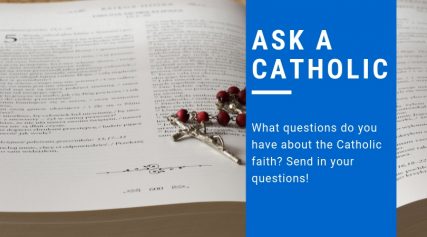What questions do you have about Catholicism? Submit them online, or fill out the form below.
By Mitch Finley
How can mortal sin exist when the Bible states over and over that believers are given eternal life? What does eternal mean to you? Does it have to apply only to the time when our body perishes despite our souls being eternal?
According to the Compendium edition of the “Catechism of the Catholic Church” (with 204 pages compared to the 903 pages of the full Catechism this edition is a much slimmer volume):
One commits a mortal sin when there are simultaneously present: grave matter, full knowledge, and deliberate consent. This sin destroys charity in us, deprives us of sanctifying grace, and if unrepented, leads us to eternal death of hell. It can be forgiven in the ordinary way by means of the sacraments of Baptism and Penance or Reconciliation” (395).
The key sentence in this paragraph is the first one. Catholic moral theologians typically comment that “full knowledge” and “deliberate consent” are probably not as common as one may think. How often does a person really possess “full knowledge” of what he or she is doing when committing an apparent mortal sin, and how often is a person fully free enough—including intellectually, emotionally and pyschologically free enough—to give deliberate and full consent to this action? Many moral theologians suggest that, in fact, a true mortal sin is exceedingly rare.
Forgiveness
Granted that a mortal sin is possible, however, no sin is beyond forgiveness when a person is genuinely sorry and resolved to never repeat the sinful action again. We need to add that, in traditional Catholic moral theology most sins are “venial,” or minor, compared to a true mortal sin.
Yes, as you say, believers receive the gift of eternal life, but this gift begins in this life and only becomes complete in the next. In his high-priestly prayer Jesus says, “This is eternal life, that they know you the only true God, and Jesus Christ whom you have sent” (John 17:3). This perspective does not mean salvation is automatic, or that our current relationship with God will be identical after we die: “For now we see in a mirror dimly, but then face to face” (1 Cor 13:12). In this world, we are called to build up treasures in heaven with our good deeds, and we can still waste the gift of eternal life through sin.
This means that we remain free to choose sinful actions even though we share in eternal life. Scripture scholars refer to this condition as “already but not yet.” That is, we already have the beginnings of eternal life, but it doesn’t become fully complete until we pass from this life to the next. Hence, even though we share in eternal life now we retain the capacity to commit sinful acts.
Eternal
This leaves us with your question about the meaning of “eternal.” Commonly, we tend to define “eternal life” as meaning endless time. On the contrary, to quote The Encyclopedia of Catholicism, Richard P. McBrien general editor: “[Eternal life] is a participation in the life of God, which begins in the present and comes to fullness beyond death. It is not just unending existence . . .”








Не поняла как это так?
My Site
Check my blog